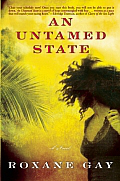Untamed Force
Roxane Gay’s “AN UNTAMED STATE”
You know those action/thriller movies like Taken or the books like that, or maybe if those are too bloody for your taste, the Lifetime Original Movies where a girl gets taken hostage, held for ransom? Those pieces seem to end with the girl being rescued (usually, literally, rescued, without the ransom actually being handed over to the criminals), running into the arms of her father or her lover, embracing them tightly, horrified by the bruise on her face from where she’s been slapped while in captivity, but ultimately, over it, because now she’s home and she’s safe and the baddies will never touch her again.
These pieces are a load of crap, and that’s probably the dumbest ending you could put on the story of a kidnapping.
Mireille, the protagonist in Roxane Gay’s debut novel, An Untamed State, watches the cable TV drama of her kidnapping with an abject amusement. “It comforts me to imagine my kidnapping had been that neatly endured and resolved,” she says.
Take it from the very first sentences, this is a novel that cuts and wounds and does nothing to cover the scars with concealer. “Once upon a time, in a far-off land, I was kidnapped by a gang of fearless yet terrified young men with so much impossible hope beating inside their bones it burned their very skin and strengthened their will right through their bones,” Gay starts. From there, we are given two distinct stories of trauma: the first, the story of Miri’s 13 days in captivity; the second, her journey back from hell and the toll that time has taken on her marriage, on her ability to let another living person touch her again.
Mirellie is stolen in broad daylight. Three SUV’s surround her husband, her infant son and herself while on their way to the beach of Port-au-Prince, Haiti. She was targeted, yes, but it’s not personal. Miri’s made the mistake of being born into wealth, of having a father with enough fortune to cover a healthy ransom.
The problem, however, comes from her father’s principles. He will not pay.
This isn’t the story of Taken, either. There’s no father searching for her on the streets, though her white, American husband tries a little. Mainly, her father sits, calm on the exterior, in their mansion, refusing to hand over the entire ransom amount, for Thirteen Days.
I can’t even begin to describe the things they do to Miri during those weeks. Angry at her father’s stubbornness, they treat her as a piece of meat, tracing her body with knives, breaking every part of her that’s made her wife and mother.
She does what she has to in order to survive. She separates. She attempts to forget the woman she was before.
Finally, the ransom is paid, she is freed, and the story should end happily there.
But how do you look at a father that abandoned you for so long? Who used you as a bargaining chip to protect the rest of his family, to prove the strength of his own resolve? How can you connect to a homeland in which your humanity has been stripped away from you? How can you be in a relationship with a man who has no idea what created the scars on your thighs? How can you hold your son when you feel you’ll never be clean again?
Gay’s been a favorite writer of mine for a while now, and as ever, I cannot comprehend this girl’s range. Just start reading bylines and you’ll find her in an instant, in places you wouldn’t even expect – everywhere from the heady Salon to the mainstream Glamour. I didn’t know what to expect from her debut novel, though. It’s a book with a cover of a murder-mystery, something I hardly ever pick up, and the plot looked a lot like those fast-action novels I never read. I always thought I’d follow Roxane anywhere, but along with many fans, I wasn’t sure if I could follow her here.
Gay-lovers: This is novel contains everything we love about Roxane already.
There’s feminism, if not overt. There are political and social justice issues directly captured in the light. There’s philosophy and history and psychiatry. There’s anything you’d want from a novel in here.
Of course, it is extremely rough. It’s graphic to the point you’ll need to take breaks. It’s disturbing and hard. It’s also extremely important and the story of a real phenomenon you shouldn’t be turning your back on. Kidnapping is a problem, and although novels are not often thought of as calls to action, this wouldn’t be the first to make a change in the world (Uncle Tom’s Cabin; The Jungle anyone?).
First things first, though: this cements Gay as more than a journalist, more than an incredible smart lady who usually maxes out around 6 or so pages. This cements her as a writer, fact or fiction or both. She’s a force to be reckoned with.






